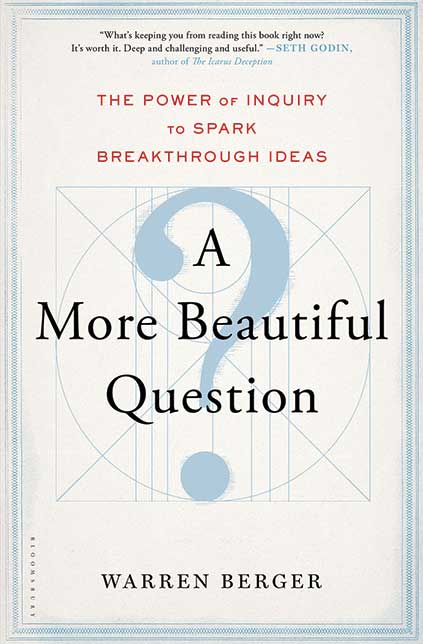A More Beautiful Question
The Power of Inquiry to Spark Breakthrough Ideas
Warren Berger, Bloomsbury USA,
New York, 2014, 272 pages
Download the PDF 

Questioning enables us to innovate, solve problems, and move ahead in our careers and lives. It also improves and informs our judgment, allows learning, sets the stage for change, and creates dialogue. Because questioning is a key leader competency required to establish a learning organization, leaders need to model asking good questions and foster an environment where others feel safe to ask questions and learn. A More Beautiful Question teaches how to do so, and I recommend it.
The author, Warren Berger, introduces a three-part framework for asking questions, “Why/What If/How.” The initial “Why” stage deals with seeing and understanding, “What If” concerns imagining, and “How” is about doing. It is a framework designed to guide one through the stages of asking. He applies this framework to the art of asking innovative questions and weaves in several good examples to illustrate its use.
Berger examines why people stop asking questions. Few organizations teach or even encourage questioning in any substantive way. Questioning is not taught in most schools, nor is it encouraged, while “correct” memorized answers are. Questions challenge authority and disrupt established structures, processes, and systems, forcing people to think about things differently. Questioning can cede power to employees, which is contrary to cultural norms in hierarchical organizations or typical classrooms.
A paradox in becoming an expert in one’s field is that questioning often has an inverse relationship to expertise. Within their own subject areas, experts tend to be poor at inquiring about their expertise. They stop asking because they think they know. However, expert knowledge may be limited, outdated, or even wrong. Having a sense of knowing can make us less curious and less open to new ideas and possibilities. Conversely, the mind of the beginner is unencumbered and free of the habits of the expert. Such a mind is more open to new possibilities, while the expert’s mind tends to close off possibilities.
In order to make questioning a habit or part of an organizational process, leaders need to make the time to fit it into their busy schedules. Part of building a culture of inquiry is teaching people to defer judgment while exploring new ideas. Many of us react to questions by trying to answer them too quickly or by countering them “devil’s advocate” style, which stifles innovation. The humbling question is, what if I am wrong? This question can put a check on our natural tendency to be certain of our views. As a leader, a key question is, how do I stay inspired so I can inspire others? Sometimes questioning involves stepping back and giving oneself time to reflect and think to come up with good questions.
A More Beautiful Question is a good book for anyone wanting to learn more about themselves and the world around them. It specifically addresses teachers, leaders, and business people, as well as taking a personal look at self-inquiry. Questioning is essential to learning and staying viable in a volatile, uncertain, complex, and ambiguous world.
Ted Thomas, PhD · Fort Leavenworth, Kansas